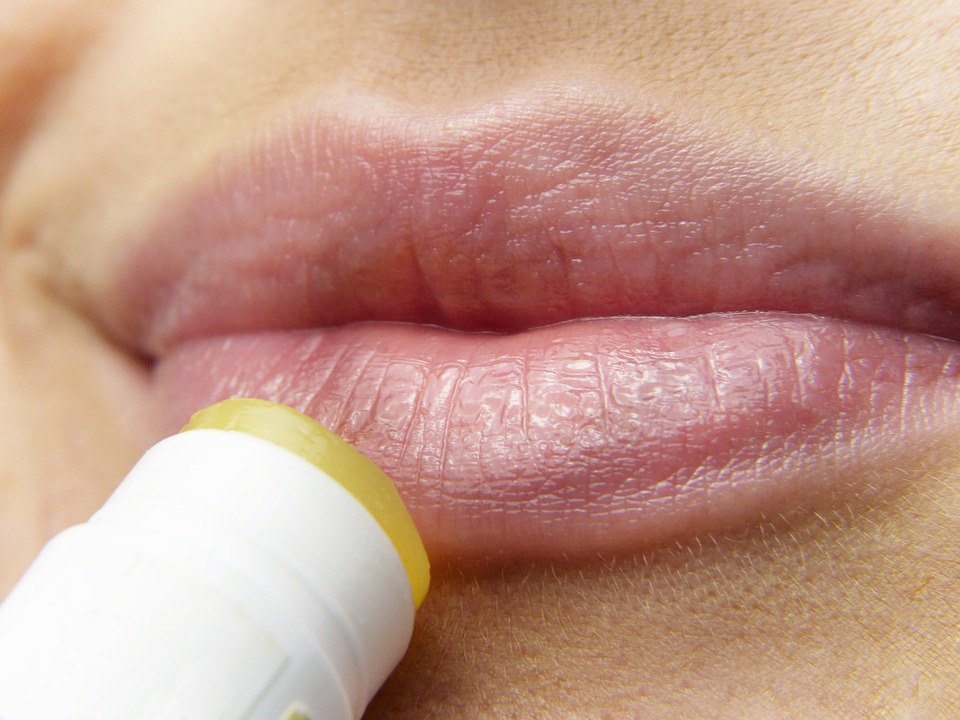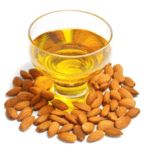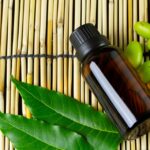Jojoba oil is a liquid wax that is extracted from the nut of an indigenous American shrub. The scientific name for this plant is Simmondsia chinensis, but the plant has nothing to do with China. The shrubby tree mainly grows in the dry areas of the southwestern United States.
The Jojoba nut has been used by the Native American tribes for centuries, its common name coming from ‘Hohowi’, the O’odham name for the nut. The people in this tribe used a paste made from the nuts of the trees for taking care of their skin and hair. They also used the whole nuts as food to survive during emergency situations.
The leaves and nuts of these plants are commonly eaten by wildlife, but the wax that makes up a large part of the nut is usually not digested. Because it is not digested by mammals, this oil can act as a laxative.
Jojoba oil is less likely to cause skin irritation than other oils because it is similar to sebum. It is used nearly as a replacement for animal fats in the manufacture of skin lotions and creams. This oil came into popularity because people were opposed to whale oil, which was used in many cosmetics before this.
Jojoba oil has a slight nutty smell and clear golden color, but the refined oil is odorless, so it doesn’t need any perfuming agents when used for cosmetic and healing purposes. This oil is also a good carrier oil for several essential oils.
Jojoba wax has a low melting point and is mostly liquid, so it doesn’t need to be diluted before use. Being a wax, it does not feel as greasy as oils.
There are many benefits to using this versatile healing oil.
How To Use Jojoba Oil For Beautiful Skin, To Heal Acne & For Eczema & Psoriasis
Skin moisturizer
If your skin is dehydrated, it is more susceptible to developing dermatitis and to infection from germs.
Since Jojoba oil is a waxy substance, it can help seal in moisture and create a barrier to protect against external elements. This substance is structurally similar to the sebaceous gland secretions in the skin, so it is generally well-received and tolerated.
To control oily skin
If you have an oily scalp or are trying to cover up your shiny forehead and nose with makeup, Jojoba oil will give you great results if you rub it into the affected areas. Although it might seem strange, using Jojoba oil can actually help to reduce the oiliness of your skin. This is by modulating the sebum production.
When the skin is kept hydrated by a layer of liquid wax, the glands that produce sebum will produce less of it. The anti-inflammatory effect of jojoba oil can help to reduce seborrheic dermatitis. . Make sure you use uncontaminated oil as diluting it with other substances can have negative consequences.
For acne control
Jojoba oil can help to reduce acne formation in several ways. First, it acts as a deep cleanser. Since it is a liquid, it can seep deep into the hair follicle. This can help dissolve the sebum deposits and dislodge the comedone, allowing the blockage to be cleared.
Additionally, Jojoba oil has anti-bacterial properties which help to control the growth of bacteria in hair follicles. It has anti-inflammatory properties that can soothe irritated skin. When used regularly, Jojoba oil can control acne. The vitamins in the oil may have a role in this. Jojoba oil may be a safer alternative to Australian Tea Tree oil, which can be toxic at higher concentrations.
For chapped lips
Jojoba oil can be used as a lip balm, which is typically made with a petroleum jelly base. The oil can create a seal that will help keep moisture locked in and make lips softer. You can make your own lip balm by mixing jojoba oil and beeswax.
For dry cuticles
Jojoba oil is beneficial because it contains vitamin E and also has anti-inflammatory and antibacterial properties. You should put one or two drops of oil into the area around your nails after you take a bath. To give your nails a thorough cuticle treatment, soak them in warm water for 5-10 minutes before applying the oil. This facilitates better absorption.
For cracked feet and dry hands
Body parts that work the hardest are our hands and feet. But the palms of the hand and the soles of the feet do not have the sebaceous glands that keep the skin on other parts of the body soft and supple.
Jojoba oil can make your hands and feet soft and smooth. If you apply a product regularly, it can prevent bacteria from growing in cracks and help the cracks heal over time.
For eczema and psoriasis
Eczema is an allergy of the skin to many different irritants, which can include frequently used dyes and the chemicals found in soaps. The buildups of dead cells on the skin caused by psoriasis can cause the skin to scale and become inflamed.
Both conditions involve dry, itchy patches that are susceptible to bacterial and fungal infections. The found that jojoba oil is quite effective in relieving conditions.
Jojoba oil acts as moisturizer, relieving itching and dryness. The greasy substance in sebum also forms a protective layer over the skin. This barrier protects the skin from external irritants, which can be helpful for people who have eczema. The anti-inflammatory property of the oil reduces the skin inflammation.
Reduces the effects of sunburn
You might think that you only need to worry about getting sunburned when you’re at the beach, but that’s not the case. If your skin turns red every time you step out, it means your skin is damaged from UV exposure.
Apply jojoba oil to the affected area to relieve inflammation. The damage control and skin repair properties of Jojoba oil come from the vitamin E and B-complex vitamins it contains. This waxy substance protects the skin and allows it to regenerate and return to normal.
To remove Makeup
Most makeup removers are harsh on skin, and they remove its moisture and hydration. It can lead to difficulties in the future and can irritate and dry out your skin. As jojoba oil is similar to sebum and very hydrating, it does an efficient job. Start with a clean face by using a cotton ball with a few drops of oil to remove your makeup. It can actually improve your cleaning process.
Use as Body Oil
Jojoba oil is a good choice for your body because it has anti-ageing, anti-inflammatory, and hydrating properties. Not only will drinking water hydrate your body, but it will also make your skin smooth and clear.
How to Use Jojoba Oil for Hair
Jojoba oil can heal a variety of issues, not just skin problems. Jojoba oil can have miraculous effects on hair. Jojoba oil has numerous benefits for men’s beard too.
Cleanses Scalp
Jojoba oil helps clean your scalp by keeping pores clean. It reduces the amount of sebum produced, preventing your hair from becoming oily, and keeps it moisturized if you have a dry scalp.
Makes Hair Shine
Jojoba oil is beneficial for your hair because it is nourishing and healing. It gives them strength and makes them shine naturally.
Hair Growth
Jojoba oil inhibits the production of sebum, which can clog hair pores and restrict hair growth, leading to hair loss. As the pores on the scalp are cleared out, they are able to absorb nutrients which leads to stimulated hair growth. A scalp massage with jojoba oil can help improve blood circulation and leave your hair feeling more softened and manageable.
Conditions Scalp
Jojoba oil can help form a protective layer on your scalp, keeping moisture locked in. It also works as a natural conditioner to keep your hair healthy and looking great.
Good for Dry Scalp
Do you have frizzy and tangled hair? Try these tips to get healthy and strong hair. If you’re looking for ways to improve your hair condition, try these tips to get healthy and strong hair. Worry not. Jojoba oil is here for your rescue. It moisturizes and conditions your hair. As jojoba oil has a similar structure to sebum, it can help to keep your hair moist and nourished. Apply oil before or along with the shampoo. It keeps your hair from getting dry and prevents it from becoming frizzy after washing.
Treats Oily Scalp
Jojoba oil production is similar to the sebum our body produces to keep our hair moisturized. Sometimes the gland that produces serum goes into overdrive, making our scalp oily. Jojoba oil can help moisturize your scalp while also sending a signal to your glands to stop producing sebum. This is because your head is already moisturized enough.
Jojoba Oil Recipes
Now that you know about the many benefits of jojoba oil, you can learn about some easy DIY recipes that will help you make the most of it.
1. Lip Balm
Use this simple homemade recipe for lip balm to keep your lips looking beautiful in all types of weather. Heal your lips, keeping them soft and plum.
Ingredients:
- 2 teaspoon beeswax
- 2 teaspoon jojoba oil
- 3 drops of peppermint oil
Method:
- Melt 2 teaspoons of beeswax into a double boiler, until it is fluid.
- Mix pure jojoba oil and peppermint oil into the mixture. It should be noted that peppermint oil is only for fragrance and flavour.
- Pour the blend in a glass container. Do not use plastic as it may melt.
- The product is ready to be used as soon as it cools down.
- Cover the balm when not in use as it may attract dust from outside.
2. Makeup Remover
Jojoba oil makes an excellent makeup remover because it doesn’t strip your skin of its natural oil, but actually moisturizes your skin better.
Ingredients:
- 4 tablespoons of hazel
- 2 tablespoon of pure jojoba oil
- 2 tablespoons of extra virgin olive oil
- 3 tablespoon of purified water
Method:
- Pour hazel in a clean and dry container
- Now add jojoba oil and extra virgin olive oil to it
- Now add purified water to it
- Close the container and shake well.
- Your makeup remover is ready. Dampen a cotton ball and wipe off your makeup.
3. Hair Mask
Jojoba oil is good for your hair, making it healthier and shinier. This deep conditioning hair mask can improve your hair’s health.
Ingredients:
- 3 tablespoons of coconut oil
- 2 tablespoon of honey
- 1 teaspoon of pure jojoba oil
Methods:
- Mix all the ingredients in a bowl
- Place the bowl in the microwave for a few seconds until warm.
- Apply the mask to clean and damp hair.
- Leave it for about 20 minutes
- Remove the mask with warm water and shampoo
- Use it once a week for good results.
4. Swimming Protectant
Swimming lovers know the feeling of having sand in their shoes or clothes. It is better to be prepared for an event beforehand rather than trying to find a solution afterwards.
Ingredients:
- 2 tablespoons of pure jojoba oil
- 1 cup water
Method:
- Add jojoba oil to warm water in a spray bottle.
- Close the bottle and mix well.
- Spray the solution freely on your hair and skin before going for a dip.
- Spray once again to prevent your hair and skin from getting dry.
Side effects of Jojoba Oil and Points To Remember
- Use pure jojoba oil and it will be great for most of the issues and benefits discussed.
- If you doubt whether you’re sensitive to jojoba oil, consult a doctor before using.
- Always do a small patch test before using it to check for allergies.
- While jojoba oil for external use is safe, it should not be consumed internally.



